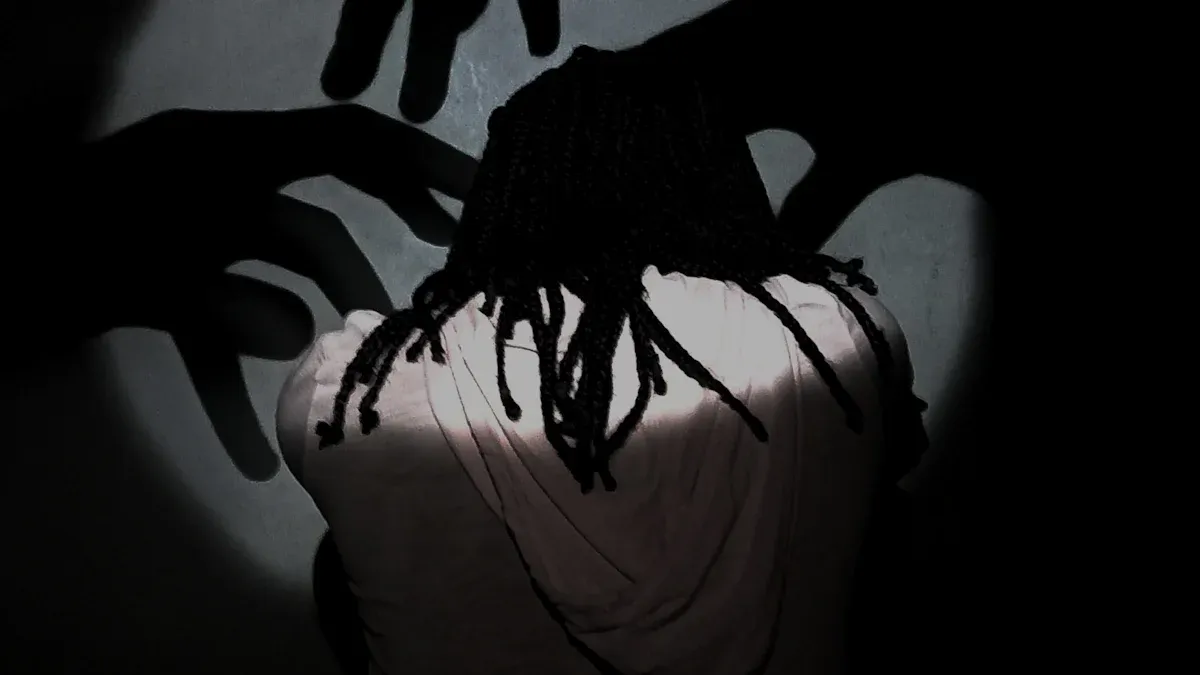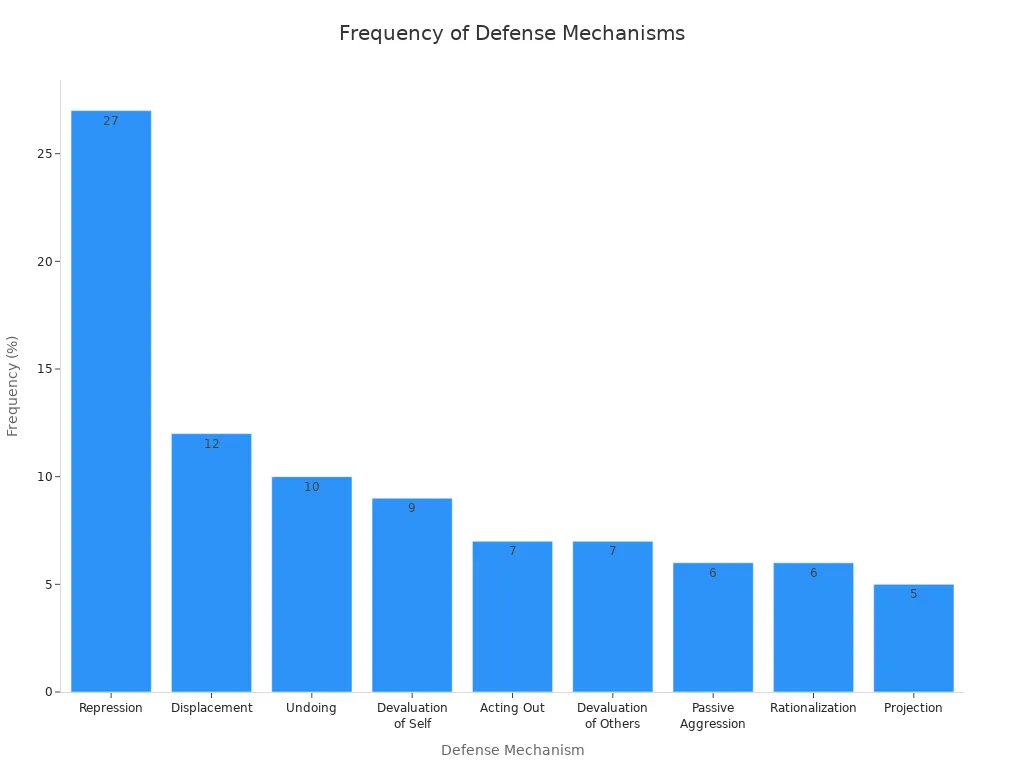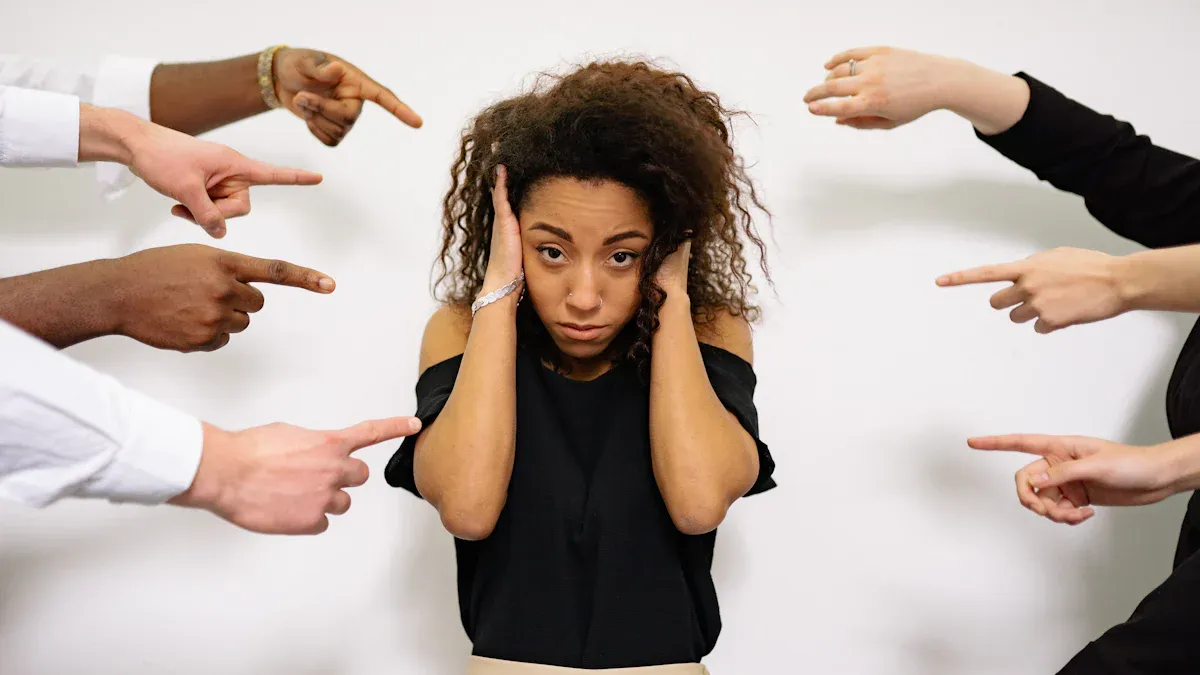Psychological Projection: Why We Blame Others for Our Own Feelings

What Is Projection as a Defense Mechanism in Psychology
Projection is a defense mechanism in psychology. It helps you avoid dealing with your own unwanted feelings. You do this by seeing those feelings in other people instead. The American Psychological Association says:
Psychological projection is a defense mechanism first introduced by Sigmund Freud. People put their own unwanted feelings or urges onto others. This helps them avoid facing those feelings in themselves. It lets a person move away from guilt or anxiety. These feelings can come from their own aggressive or sexual feelings.
You might see projection in your daily life. It often happens when you feel emotions that make you uncomfortable. Recent studies show about 11.3% of people use projection in tough situations. In clinical psychology, experts talk about projection less than some other defenses. You can see this in the chart below:

Learning about projection can help you see how it changes your thoughts and actions. If you understand projection defense mechanism manipulation psychology, you can start making better choices.
Key Takeaways
Projection is when you think others have your bad feelings. This lets you avoid dealing with those feelings yourself.
Noticing projection can help your friendships. It helps you know your feelings and talk better with people.
To stop projecting, try to notice your own feelings. Think about your feelings and ask if they are really yours or if you are putting them on someone else.
Saying how you feel with 'I' statements helps you share your feelings. This way, you do not blame others and talks are healthier.
Mindfulness can help you project less. It helps you see your feelings without judging them and helps you grow.
Not Sure If You Are Been Gaslighted?
Sometimes it's hard to recognize gaslighting and emotional manipulation. Our Gaslighting Check app helps you identify patterns and provides personalized guidance based on your specific situation.
Try Gaslighting Check App NowProjection as a Defense Mechanism
Psychological Projection Explained
Projection happens when you put your own feelings on someone else. For example, if you feel angry but do not want to admit it, you might say someone else is angry. This helps you avoid feelings that make you upset. Projection works in your mind without you knowing it. You may not notice you are doing it.
Sigmund Freud first talked about projection in his theory. Anna Freud later added more ideas about it. Projection lets you move unwanted feelings outside yourself. You see these feelings in other people. This helps protect your self-esteem. Freud thought this defense keeps you safe from guilt and anxiety. You do not have to face your own bad thoughts.
When you use projection, you might not understand others. This can hurt your relationships and make problems harder to fix. Learning about projection helps you see these patterns and improve your mental health.
Researchers found projection is important in how you handle emotions. It can cause confusion and fights with friends or family. You might blame others for things you do not like about yourself. This makes trust and clear talking harder.
Here are some main points about projection:
You put your own bad traits or feelings on others.
You do not see these traits in yourself.
Projection is usually unconscious and protects your ego.
It helps you deal with stress and tough emotions.
Studies show projection happens in many situations. The table below shows some research results:
Study Title | Focus | Findings |
|---|---|---|
Empirical Studies of Projection: A Critical Review | Looks at research on projection | Shows projection is complex and defensive in psychology. |
Defensive Projection. An Investigation of Its Role in Paranoid Conditions | Looks at projection in paranoia | Finds projection is common in social situations. |
Attributive Projection: Test of Defensive Hypotheses | Looks at attributive projection | Finds people with high self-esteem project negative traits. |
Causal projection, similarity projection, and coping with threat to self-esteem | Looks at types of projection | Shows projection helps with stress from self-esteem threats. |
Blaming others: Individual differences in self-projection | Looks at self-regulation and blame | Finds self-regulation affects how much you blame others. |
Real-Life Projection Examples
Everyday Scenarios
Projection happens in many parts of life. Sometimes, you blame others for things you feel inside. This defense mechanism shows up when you feel bad or want to avoid guilt.
You might say a friend is angry when you feel upset.
Some people point out small mistakes because they feel unsure about themselves.
Someone who feels jealous may say others are jealous of them.
If you have trouble being honest, you might think others lie or steal.
Kids sometimes bully classmates because they feel unsure about themselves.
Parents may want their kids to do things they could not do.
Students sometimes say teachers caused their bad grades to avoid blame.
Note: Projection can make you think others have problems that really come from your own feelings. This can cause confusion and fights.
Relationships
Projection changes how you act with family, friends, and partners. In close relationships, this defense mechanism can cause stress and confusion.
In families, parents may worry about a child and treat them like something is wrong, even if the child is fine. This can hurt the child’s self-esteem and feelings.
In romantic relationships, a partner who feels guilty about cheating may accuse the other person of cheating.
Someone who feels bad about their looks may criticize their partner’s appearance.
Narcissistic people sometimes put their own fears and weaknesses onto others to protect themselves.
You can notice projection by watching for times when someone blames others for feelings or actions they do not want to admit. Seeing these signs helps you have better relationships and understand yourself more.
Recognizing Psychological Projection

Signs in Yourself
You can spot projection by watching your thoughts and actions. Sometimes, you do not notice it right away. You might feel weird or want to defend yourself. Clinical psychologists found some signs that show you might be projecting:
You say you do not have problems but think others do.
You get upset or defensive when someone talks about you.
You feel bad when someone gives you helpful criticism.
You act one way alone and another way with people.
You blame others for things you do not like about yourself.
If you want to stop projection, try being kind to yourself. Accepting your flaws makes you blame others less. A therapist can help you see when you use projection. Therapists use things like Cognitive-Behavioral Therapy (CBT) to help you change. You can learn to take feedback and understand your feelings more.
Tip: If you feel defensive, stop and ask if you are projecting. This can help you notice projection and make better choices.
Signs in Others
You might see projection in people around you. Some people blame others for things they do too. Others say their friends or family have problems they will not admit. You may see someone get very upset by feedback or criticism. They might act one way in public and another way at home. These are signs someone could be using projection.
If you see projection in others, try to stay calm. Remember, people often do not know they are projecting. You can set good boundaries and talk openly. If it keeps happening, suggest they talk to a counselor or therapist. This can help them see projection and have better relationships.
How Projection Affects Relationships

Impact on Communication
Projection can make talking with others much harder. When you use this defense mechanism, you may blame someone else for feelings you do not want to admit. This can confuse both you and the other person. You might say, "You are always angry," when you feel upset yourself. This makes it tough to solve problems together.
When projection happens, trust can break down. People may stop sharing their true thoughts. You might feel like others do not understand you. They may feel blamed for things they did not do. Over time, this can lead to more arguments and less honesty.
Note: If you use projection often, you may notice that friends or family pull away. They might feel hurt or misunderstood. This can create distance in your relationships.
You may also see repeated patterns. If you keep using this defense mechanism, you may find yourself in the same fights again and again. This can make you feel stuck. It can also stop you from building strong, healthy connections.
Emotional Consequences
Projection does not just hurt communication. It also affects how you and others feel. When you use this defense mechanism, you may avoid your own feelings. This can stop you from growing and learning about yourself.
Here are some common emotional effects for both you and the people around you:
Relationships can become strained. Misunderstandings and conflict may grow, leading to frustration and resentment.
You may reinforce negative beliefs about yourself. This can make it harder to feel good or change for the better.
Projection can make anxiety and depression worse. You may feel more alone or worried.
The person who receives your projection may start to doubt themselves. Their self-esteem can drop, and they may feel confused about their own feelings.
If you keep using projection, these problems can get worse over time. You may see toxic patterns repeat in your relationships. People may feel unheard or unloved. Children who see projection at home may take on their parents' issues. This can shape how they see themselves and others as they grow up.
Tip: Noticing how projection affects relationships can help you make changes. When you understand this defense mechanism, you can start to build trust and share your real feelings.
Projection is a common part of psychology. Many people use it without knowing. If you learn to spot it, you can protect your relationships and help everyone feel safer and more understood.
Stopping Projection Defense Mechanism Manipulation Psychology
Self-Awareness
You can stop projection defense mechanism manipulation psychology by learning about yourself. When you notice your feelings and thoughts, you can catch yourself before you put them on others. Experts suggest many ways to build this skill:
Psychodynamic therapy helps you find hidden feelings and see what you avoid.
Cognitive-behavioral approaches teach you to spot thinking mistakes and check your ideas about others.
Mindfulness-based practices help you notice your emotions without judging them.
Schema therapy links your current projection to things you learned as a child.
Using "I" statements helps you own your feelings.
Shadow work lets you look at parts of yourself you ignore.
Emotion regulation skills teach you to name and accept your feelings.
Curiosity and compassion help you learn about yourself and others without blaming.
Tip: When you feel upset, stop and ask, "Is this feeling really about me?" This question can help you notice projection defense mechanism manipulation psychology happening.
Practical Steps
You can take simple steps to lower projection defense mechanism manipulation psychology in your life. Spend time alone to understand your thoughts and feelings. Journaling, reading self-help books, or doing self-development activities can help. Question your thoughts and check if they are true or just guesses. Good communication skills help a lot, since projection often happens when you cannot share your real feelings.
Try these actions to stop projection:
Self-reflection: Write down good moments and think about why they were good.
Conflict analysis: Describe a conflict from your view and the other person's view.
Progress monitoring: Track your emotional reactions over time to see patterns.
Gratitude journaling: List things you are thankful for to focus on the good.
Future intentions: Set goals for how you want to handle things next time.
Manage blame shifting by taking responsibility for your actions. If you miss a deadline, admit it and plan how to do better.
Reduce criticism by celebrating others' wins. Focus on your own growth.
Handle feedback by listening closely, asking for details, and making a plan to improve.
Note: You can use projection in therapy to learn about yourself. Therapists can help you see when you use this defense mechanism and guide you to change your habits.
When you practice these steps, you break the cycle of projection defense mechanism manipulation psychology. You build stronger relationships and feel more in control of your emotions.
Projection vs. Other Defense Mechanisms
When you learn about defense mechanisms, you find out projection is just one way your mind protects you. Other defense mechanisms work in their own ways. You can tell them apart if you know what signs to look for.
Denial
Denial is a different defense mechanism. You use denial when you do not want to accept something hard or painful. For example, you might ignore a bad grade or act like a problem is not real. Denial helps you avoid stress, but it can keep you from fixing problems. Denial does not put your feelings on someone else. You just block out what is true.
Displacement
Displacement works in another way. You move your feelings from the real person to someone safer. If you feel angry at your boss, you might yell at your friend instead. This defense mechanism lets you let out strong feelings without facing the real reason. You do not see your own traits in others like you do with projection. You just move your feelings.
Here is a table to help you compare projection and displacement:
Feature | Projection | Displacement |
|---|---|---|
Definition | Attributing one's own negative traits to others | Redirecting feelings from one target to another |
Mechanism | Distorts motivations of the target | Transfers feelings to a less threatening target |
Emotional Focus | Focuses on the negative traits of the self | Focuses on feelings about one person redirected to another person |
Rationalization
Rationalization is another defense mechanism you might use. You explain your actions with reasons that make you feel better, even if those reasons are not true. For example, you might say you did not want a promotion after you did not get it. Rationalization helps you feel okay about your choices. Projection is different. You put your own feelings onto someone else. If you dislike a co-worker, you might believe that person dislikes you instead.
Rationalization: You make up reasons for your actions to feel better.
Projection: You see your own feelings in other people instead of facing them yourself.
You use defense mechanisms to protect yourself from tough emotions. When you know how projection is different from other defense mechanisms, you can understand your reactions and make better choices.
You found out that projection lets you avoid your own bad feelings by seeing them in other people. Projection can keep you safe, but it can also make your relationships worse. Studies show projection happens in different ways and can change your mental health.
Projection happens without you knowing and can help or hurt you.
You might use classical, attributive, or rationalizing projection.
Thinking about your feelings helps you see them and use less projection.
Mindfulness and looking at conflicts can lower projection and help you feel better.
Look for projection in your everyday life. Think about what you do and try mindfulness. You can make your relationships better and feel more sure of yourself. Remember, you can choose how projection affects you. 😊
FAQ
What is the main purpose of projection as a defense mechanism?
Projection helps you protect yourself from feelings you do not like. You use it to avoid guilt or anxiety. You see your own unwanted emotions in other people.
Tip: If you notice projection, you can learn about your real feelings.
How can you tell if you are projecting onto someone?
You may blame others for things you do not like about yourself. If you get upset when someone gives feedback, you might be projecting. Writing in a journal can help you find these patterns.
Can projection happen without you knowing it?
Yes, projection often happens without you noticing. You may not know you are doing it. Your mind uses this defense to keep you safe from hard feelings.
Does projection only happen in negative situations?
Projection mostly shows up with negative feelings like anger or jealousy. Sometimes, you can project good traits too. You might see your strengths in others and feel close to them.
How can you stop using projection in daily life?
You can practice self-awareness. Try to notice your feelings before you react. Use "I" statements to share your thoughts. Talking with a therapist can help you understand and change this habit.